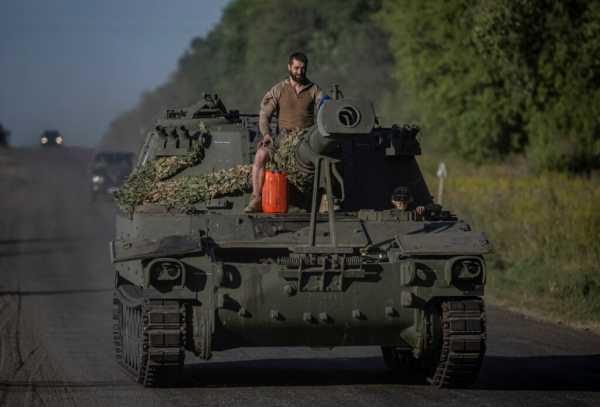
The Ukrainian invasion of Russia is now in its third month with little indication that it will end any time soon. Despite a series of Russian counterattacks since the invasion began on August 6, Ukraine continues to control an area of around one thousand square kilometers inside Russia’s Kursk Oblast.
This unprecedented Ukrainian occupation of Russian territory has revealed the limitations of the Kremlin war machine. While many continue to view the Russian military as an irresistible force with virtually limitless supplies of men and machines, it is now increasingly apparent that in reality, Putin’s attempt to conquer Ukraine has left his army dangerously overstretched and unable to defend Russia.
Ukrainian President Volodymyr Zelenskyy had initially hoped that by invading Russia, he could pressure Putin into withdrawing troops from Ukraine in order to strengthen the home front. So far, this has not happened. Instead, the Russian army has continued to advance in eastern Ukraine and has captured a number of towns and villages since Ukraine’s cross-border incursion began. At the same time, the fact that Putin has had to choose between the invasion of Ukraine the defense of Russia is in itself telling.
Russia’s difficulties on the Kursk front are the latest indication of Moscow’s mounting manpower issues. In recent months, the Russian military has reportedly been forced to dramatically increase the bounties on offer to new recruits. According to investigative Russian news outlet Vyorstka, those who do agree to sign up to fight in Ukraine are now often in very poor health, with the average age of volunteers rising from forty at the start of the invasion to around fifty.
Other signs that Putin is being forced to scrape the bottom of the barrel to fill the depleted ranks of his army include reports that sailors from Russia’s only aircraft carrier, the Admiral Kuznetsov, have been withdrawn from naval service and deployed to Ukraine as infantry. Russia is also in the process of passing new legislation that will allow defendants to sign military contracts and avoid prosecution. Tens of thousands of Russian prisoners have already been released from jail to fight in Ukraine.
Meanwhile, as Ukrainian troops crossed the border into the Kursk region in early August, they found that most of the Russian defenses in the border zone were manned by young conscript troops who were soon surrendering in large numbers. This has allowed Ukraine to replenish its exchange fund and conduct a number of prisoner swaps, while sparking considerable disquiet within Russian society.
Putin’s uncharacteristically low-key reaction to Ukraine’s Kursk incursion suggests that he is well aware of his army’s shortcomings. Far from threatening World War III or attempting to rally his country against the foreign invader, Putin has sought to downplay the entire invasion, and has had remarkably little to say about what is the first foreign occupation of Russian land since World War II.
This underwhelming response has been evident since the very first days of Ukraine’s offensive, which Putin initially dismissed as a mere “provocation.” The Russian media has reportedly been instructed by the Kremlin to minimize the significance of Ukraine’s invasion, and has been handed the task of convincing domestic audiences that the presence of Ukrainian troops inside Russia is now the “new normal.”
This does not mean that the Russian military is on the brink of collapse, of course. On the contrary, Putin has recently unveiled ambitious plans to further expand the size of his army to one and a half million soldiers, a move that would make it the second largest in the world after China. He can also announce a further mobilization if necessary, although this would be a major gamble that could lead to domestic instability.
While Putin still has plenty of options to keep the war going, the available evidence clearly indicates that he has already committed the vast majority of his current military resources to the invasion of Ukraine and has very little left in reserve. Despite deploying virtually all of his country’s expensively assembled military might, Putin has so far been unable to break Ukraine’s resistance or occupy more than 20 percent of the country. Indeed, Russia’s gains since the blitzkrieg advances in the first few months of the invasion have been remarkably modest and have come at a terrible cost.
This should give pause to those who argue that Russia is simply too big to lose and always wins in the end. Advocates of a compromise peace often imply that Russia cannot be beaten on the battlefield and can only be bought off with territorial concessions. This kind of thinking fuels dangerous defeatism and is also historically illiterate. In fact, Russia has a long history of defeats in recent centuries including the Crimean War, the Russo-Japanese War, and the Cold War. Russia even managed to lose World War I despite starting on the winning side.
There is nothing inevitable about Russian victory in the current war. Ukraine’s invasion of the Kursk region has proved that Putin’s army is overextended and vulnerable. With sufficient support from their partners, Ukraine will deliver further blows that can end the current war and establish a lasting peace in Eastern Europe. There may never be a better opportunity to deter future acts of Russian aggression. If the West chooses not to seize this chance, the cost of stopping Russia will only rise.
Peter Dickinson is editor of the Atlantic Council’s UkraineAlert service.
Source: euractiv.com